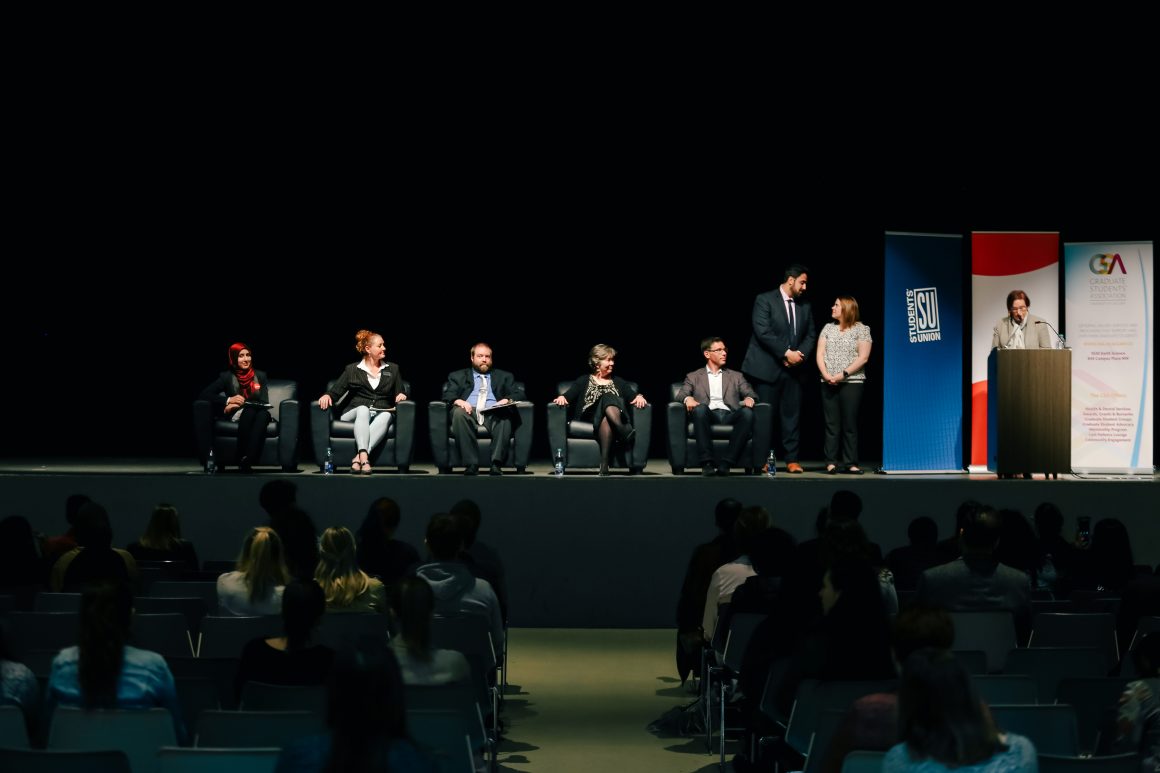
Alberta election candidates talk post-secondary issues at MacHall forum
By Jason Herring, April 10 2019 —
An on-campus Alberta election forum on April 9 posed questions about post-secondary issues to candidates from five provincial parties.
Calgary-Varsity candidate Anne McGrath (New Democratic Party), Calgary-Elbow candidate Doug Schwietzer (United Conservative Party), Calgary-Varsity candidate Beth Barberree (Alberta Party), Calgary-North candidate Saliha Haq (Liberal Party) and Red Deer-South candidate TJ Cartwright (Freedom Conservative Party) took the stage of MacHall AB for the forum. Each party with a seat in legislature at the dissolution of the previous government was given the opportunity to send a representative to the forum.
The forum was put on in a collaboration between the University of Calgary, the Students’ Union and the Graduate Students’ Association. SU president Sagar Grewal and GSA president Brit Paris moderated the event. About 50 people attended the forum.
While five candidates took part in the forum, the show was stolen by McGrath and Schwietzer, the candidates for the two parties expected to contend for government in the April 16 election. The NDP and UCP candidates went on the attack against each other’s parties.

McGrath emphasized early in the forum that the election was a two-horse race and that students could choose between having NDP leader Rachel Notley or UCP leader Jason Kenney as premier. She also repeatedly said throughout the forum that a UCP government would lead to cuts to post-secondary and health-care sectors.
“For post-secondary students and post-secondary institutions, that question in most critical. If you’re choosing to vote for a premier Jason Kenney, you’re voting to give a $4.5-billion tax cut to corporations,” McGrath said, referring to Kenney’s proposed cut of the corporate tax rate to eight per cent. “With Notley, you’re voting for a premier who has proven to have priorities important to Albertans, which is to support our health care system and our education system.”
In his opening remarks, Schweitzer put a spotlight on economic issues, a theme that would continue throughout the forum. Specifically, he focused on in-province job opportunities for students, which he said have declined in recent years.
“I’ve had so many university students come to me and say, ‘Your generation had it easier than mine.’ And I’m 40 years old,” Schweitzer said. “We used to have a confident Alberta that knew what its future stood for, where you could get opportunities. We’re going to have that again.”
One question posed to candidates asked how each of their parties would approach tuition regulation. Post-secondary tuition for domestic students is currently frozen through the 2019–20 academic year, after which point tuition increases will be capped to the rate of inflation. Tuition for international students is not currently regulated.

Schweitzer said that his experience of having student loans upon graduation showed him why students need affordable education. He said the UCP would keep tuition increases tied to CPI.
“Our party is committed to making sure tuition is affordable and an increases are in line with Alberta’s consumer price index,” he said.
McGrath pointed to the NDP’s tuition freeze as evidence of the party’s goal of affordable education, adding that the province also provided backfill funding to post-secondaries.
“Every student that wants to attend should be able to attend and should not be barred from it as a result of those costs,” McGrath said. “But you can’t reduce tuition fees at the expense of quality of education, which is why the tuition freeze was backstocked with additional funding from the government.”
The question sparked the most contentious moments of the forum, as McGrath and Schwietzer sparred on post-secondary funding.
“I think it’s very, very important that all of us consider what government we’re going to have. Is this going to be a government that supports post-secondary education or not?” McGrath asked. “A spending freeze, as the UCP proposed, means that there will be cuts to education and those cuts will hurt all of us.
“I hate to comment on math at a debate, but their math doesn’t add up,” McGrath later added.
“I agree with Anne on one point there — we do have a big choice to make: Do our graduates want jobs when they graduate?” Schweitzer responded. “That’s an important issue for our students to answer for themselves this election campaign. That’s what’s at stake for your future.”
Elsewhere, Haq emphasized the fact that she is a current U of C student and that she’s familiar with problems students are facing, while Barberree pushed back on the notion that this election is only between the NDP and the UCP.
“I’d like to propose in this election that it’s not a two-horse race, as the media and my colleagues in the UCP and the NDP would have you believe,” she said. “We believe that there needs to be a balanced space in the middle and that represents most Albertans.”
General voting for the 2019 Alberta general election takes place on April 16. Find your polling station and whether you are eligible to vote on the Elections Alberta website. Advanced polls are also open on campus in MacHall next to the Q Centre April 10 and 11 from 10 a.m. – 3 p.m., where students can vote regardless of their home riding.
